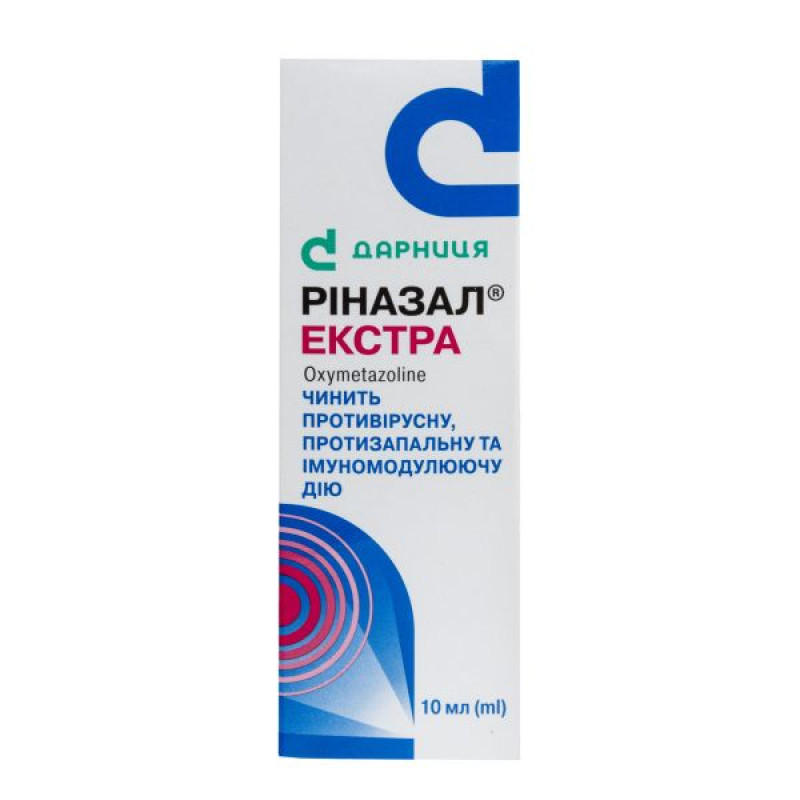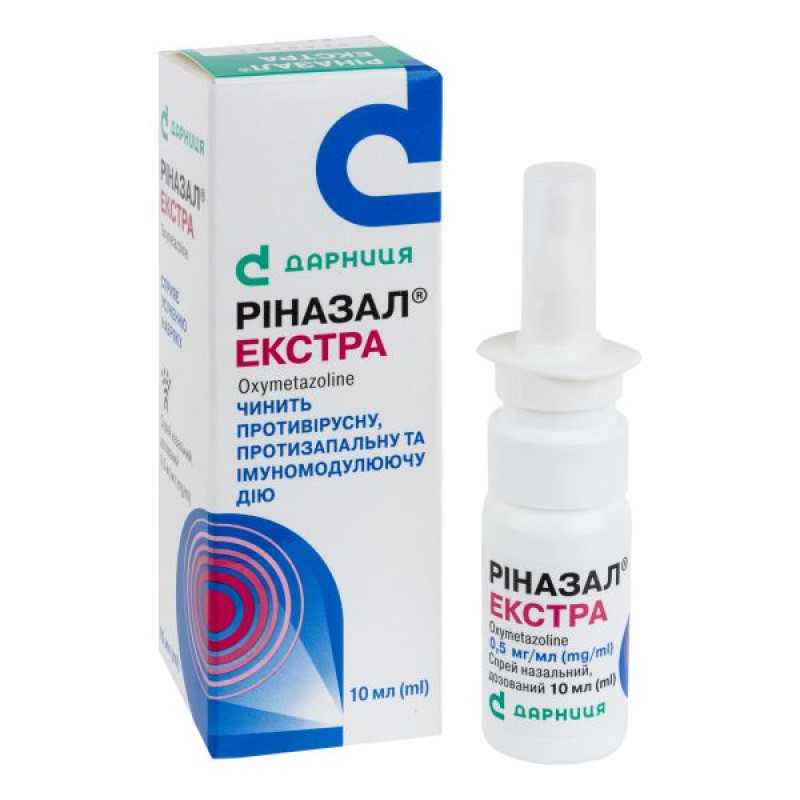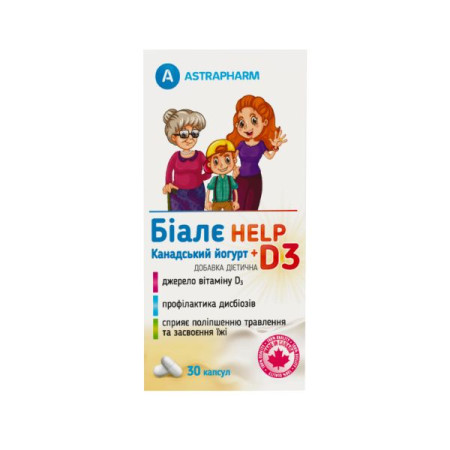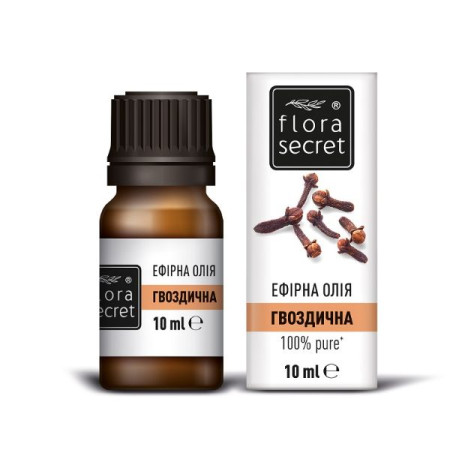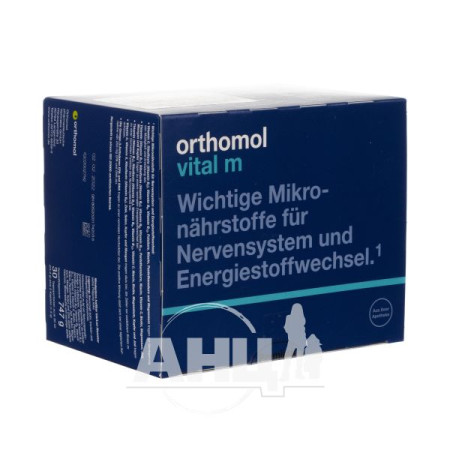Rinazal Extra nasal spray dosed 0.5 mg/ml bottle 10 ml
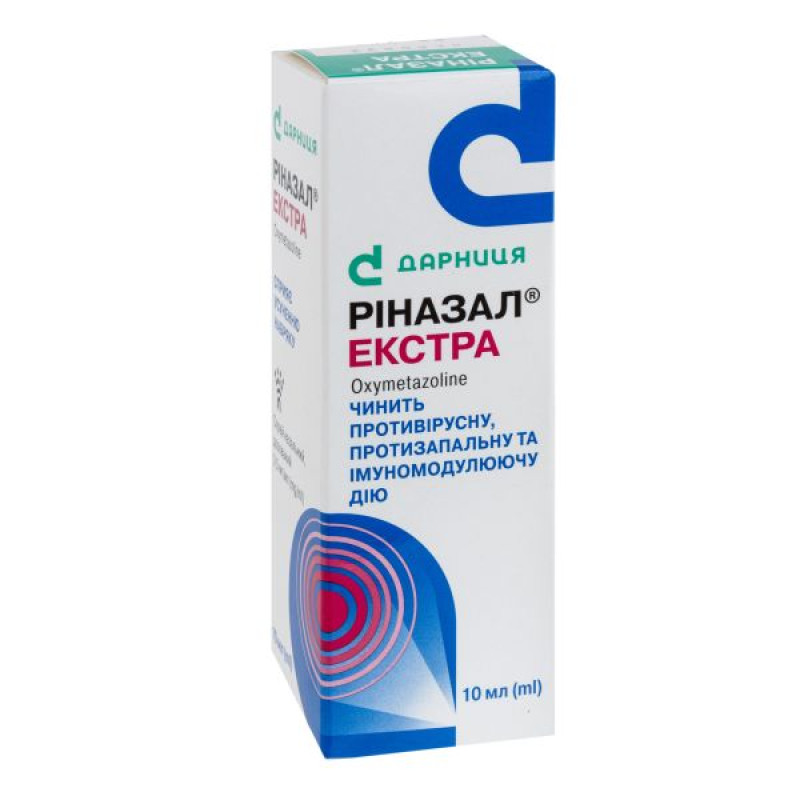
Instructions for Rinazal Extra nasal spray dosed 0.5 mg/ml bottle 10 ml
Composition
active ingredient: oxymetazoline;
1 ml of solution contains oxymetazoline hydrochloride 0.5 mg;
Excipients: sodium citrate; citric acid monohydrate; disodium edetate; polysorbate 20; non-crystallizing liquid sorbitol; levomenthol; cineole; chlorhexidine digluconate solution; benzalkonium chloride; dry aloe extract; (-)-carvone; sodium hydroxide; purified water.
Dosage form
Nasal spray, metered.
Main physical and chemical properties: clear liquid from slightly yellowish to yellow. Foams when shaken.
Pharmacotherapeutic group
Anti-edematous and other agents for topical use in diseases of the nasal cavity. Sympathomimetics.
ATX code R01A A05.
Pharmacological properties
Pharmacodynamics
Oxymetazoline is a direct-acting sympathomimetic amine. It acts on α-adrenergic receptors of the blood vessels of the nasal mucosa, causing vasoconstriction and eliminating mucosal edema. Oxymetazoline constricts blood vessels at the site of application, reduces edema of the nasal mucosa and upper respiratory tract. Elimination of edema of the nasal mucosa contributes to the restoration of aeration of the paranasal sinuses and the middle ear cavity, which prevents the development of bacterial complications.
Oxymetazoline has antiviral, anti-inflammatory, immunomodulatory and antioxidant effects. Thanks to this combined mechanism of action, faster and more effective elimination of swelling of the nasal mucosa caused by acute rhinitis has been proven. The duration of action of the drug is up to 12 hours.
Pharmacokinetics
When applied topically to the nose in therapeutic concentrations, it does not irritate the nasal mucosa or cause hyperemia. The half-life is approximately 35 hours after administration.
2.1% of the drug is excreted by the kidneys, approximately 1.1% - with feces.
Indication
Acute respiratory diseases accompanied by nasal congestion; allergic rhinitis; vasomotor rhinitis; to restore drainage and nasal breathing in diseases of the paranasal sinuses of the nasal cavity, eustachitis; to eliminate edema before diagnostic manipulations in the nasal passages.
Contraindication
Hypersensitivity to the active substance, other adrenomimetics or to any of the excipients; atrophic rhinitis; inflammation or damage to the nasal mucosa or skin around the nostrils; use simultaneously with monoamine oxidase inhibitors (MAO) and within 2 weeks after discontinuation of treatment with MAO inhibitors, as well as simultaneous use with other drugs that contribute to an increase in blood pressure; increased intraocular pressure, especially angle-closure glaucoma; severe forms of cardiovascular diseases (e.g. ischemic heart disease, arterial hypertension); cardiac asthma, tachysystolic heart rhythm disorders, angina pectoris; pheochromocytoma; metabolic disorders (hyperthyroidism, diabetes mellitus, porphyria); history of transsphenoidal hypophysectomy; difficulty urinating with prostate enlargement (prostatic hypertrophy).
Interaction with other medicinal products and other types of interactions
Do not use MAO inhibitors and other drugs with hypertensive effects due to the risk of increased blood pressure.
Concomitant administration of other vasoconstrictor drugs increases the risk of side effects.
This medication interacts with tricyclic antidepressants, which increases the risk of developing arterial hypertension and arrhythmia.
The drug should be used with caution in patients taking bromocriptine, as cardiovascular disorders may develop.
May weaken the effect of ß-blockers or other antihypertensive drugs, such as methyldopa, betanidine, debrisoquine and guanethidine.
Application features
Long-term use and overdose of the drug should be avoided. Long-term use of a nasal decongestant may lead to a weakening of its effect. Abuse of this drug may cause atrophic rhinitis, atrophy of the mucous membrane and reactive hyperemia with rhinitis medicamentosa. Patients with chronic rhinitis require special observation. Doses above the recommended ones can be used only under the supervision of a doctor.
If symptoms worsen or there is no improvement within 3 days, you should consult a doctor.
Benzalkonium chloride, which is part of the drug, can cause swelling of the nasal mucosa, especially with long-term use. If there is a suspicion of such a reaction (persistent nasal congestion), it is necessary to use a drug that does not contain preservatives. If it is impossible to use the drug without preservatives, the possibility of using another dosage form should be considered.
Ability to influence reaction speed when driving vehicles or other mechanisms
After prolonged use of the drug in doses exceeding the recommended ones, a general effect on the cardiovascular and nervous systems cannot be excluded. In such cases, the ability to drive may be impaired.
Use during pregnancy or breastfeeding
The use of the drug in women during pregnancy is possible only if, in the opinion of the doctor, the benefit of use for the mother outweighs the potential risk to the fetus/child. The drug should be used with caution during pregnancy, and with special caution in patients with hypertension or signs of reduced placental blood supply. Frequent or prolonged use of high doses may lead to a decrease in placental blood flow.
It is not known whether oxymetazoline passes into breast milk. In the absence of these data, the drug should not be used during breastfeeding.
Method of administration and doses
1 inhalation dose (50 μl) contains approximately 25 μg of oxymetazoline hydrochloride.
Adults and children over 6 years of age: 1 spray into each nasal passage 2-3 times daily.
The drug should not be used for longer than 5-7 days. Do not use doses higher than recommended.
The medicine can be used again only after a few days.
Children.
The medicine should not be used in children under 6 years of age.
Overdose
After a significant overdose or accidental ingestion, the following symptoms may occur: mydriasis, nausea, vomiting, cyanosis, fever, cramps, tachycardia, palpitations, arrhythmia, cardiovascular failure, cardiac arrest, increased sweating, agitation, convulsions, arterial hypertension, pulmonary edema, respiratory disorders, pallor, miosis, hyposmia, mental disorders.
In addition, depression of the central nervous system functions may occur, manifested by drowsiness, decreased body temperature, bradycardia, hypotension, apnea, and possible development of coma.
Clinical manifestations of overdose in children include central nervous system manifestations such as convulsions and coma, hallucinations, bradycardia, apnea, hypertension alternating with hypotension.
Treatment: gastric lavage, administration of activated charcoal, ventilation of the lungs. If blood pressure decreases, use phentolamine. Vasopressors should not be taken. If necessary, anticonvulsant therapy is indicated. In severe cases, intubation and artificial ventilation of the lungs may be necessary.
Adverse reactions
On the part of the organs of vision: eye irritation, redness or discomfort, blurred vision.
On the part of the respiratory system, chest organs and mediastinum: nasal discomfort, burning or dryness of the nasal mucosa, dryness and irritation in the mouth and throat, sneezing, nosebleeds. After the effect of the drug wears off, a feeling of severe nasal congestion (reactive hyperemia) may occur. Apnea in newborns and young children (especially in case of overdose).
From the nervous system: headache, insomnia, anxiety, drowsiness, restlessness, tremor, sedative effect, irritability, convulsions, hallucinations (especially in children), increased fatigue.
Cardiovascular system: tachycardia, palpitations, hypertension, heart pain, flushing.
Immune system disorders: allergic reactions, including rash, itching, angioedema.
General disorders and administration site conditions: reactive hyperemia, headache, nausea, rash and visual disturbances.
Reporting of suspected adverse reactions
Reporting suspected adverse reactions after the marketing authorisation of a medicinal product is an important procedure. It allows for continued monitoring of the benefit-risk balance of the medicinal product in question. Healthcare professionals should report any suspected adverse reactions via the national reporting system.
Expiration date
1.5 years.
After first opening the bottle, store for no more than 2 months.
Storage conditions
Store in the original packaging at a temperature not exceeding 25 ° C. Do not freeze.
Keep out of reach of children.
Packaging
10 ml in a bottle, 1 bottle with a dosing pump in a pack.
Vacation category
Without a prescription.
Producer
PrJSC "Pharmaceutical Company "Darnitsa".
Location of the manufacturer and its business address.
Ukraine, 02093, Kyiv, Boryspilska St., 13.
There are no reviews for this product.
There are no reviews for this product, be the first to leave your review.
No questions about this product, be the first and ask your question.







